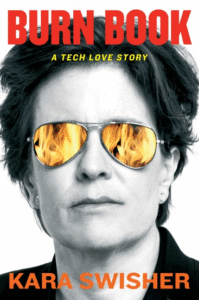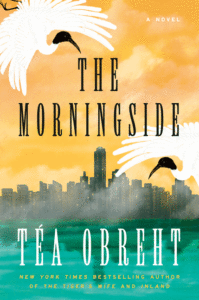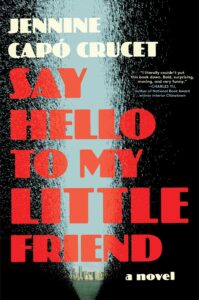
Our quintet of quality reviews this week includes Francine Prose on Kaveg Akbar’s Martyr!, Edward Ongweso Jr. on Kara Swisher’s Burn Book, James Wood on Amitava Kumar’s My Beloved Life, Patrick McGuinness on Téa Obreht’s The Morningside, and David L. Ulin on Jennine Capó Crucet’s Say Hello to My Little Friend.
“Perhaps it’s the moment in which we live, when so much of what’s happening around us seems bleak and chaotic or, worse, like more evidence of the victory of soulless capitalism. But there’s something immensely appealing about a meticulously written novel whose characters (Cyrus isn’t the only one) are busily searching for meaning. It’s a pleasure to read a book in which an obsession with the metaphysical, the spiritual, and the ethical is neither a joke nor an occasion for a sermon. And it’s cheering to see a first-time (or anytime) novelist go for the heavy stuff—family, death, love, addiction, art, history, poetry, redemption, sex, friendship, US-Iranian relations, God—and manage to make it engrossing, imaginative, and funny … This compulsive overthinking is at once the source of Cyrus’s charm and his particular burden. His interior monologues, his conversations with Zee, his observations, and his metaphorical cast of mind allow Akbar to switch from druggy lyricism to gritty plain speech, a gift that made me think of another poet-novelist, Denis Johnson. Cyrus’s mental high-wire act keep us with him throughout the novel, even when we may suspect that, were we to meet him in life, he might drive us a little nuts.”
–Francine Prose on Kaveh Akbar’s Martyr! (The New York Review of Books)

“…a tortured and tortuous memoir that, in remixing swaths of past reporting and commentary, as well as regurgitating tales she’s told ad nauseam, tries to answer two burning questions: How did Silicon Valley end up in that room with Trump? And, more importantly, how did a tech journalist as good and uncompromising as Kara Swisher fail to anticipate this turn to the dark side? The long and short of it is that Swisher is not a good journalist—or, framed more generously, that she thrived in an industry with remarkably low standards for which we are still paying the price. For decades, tech journalism and criticism has primarily consisted of glowing gadget reviews, laudatory profiles, and reprinted press releases, all of it colored by Silicon Valley’s self-aggrandizing vision of itself as a laboratory of a brighter future … she tries to atone for her decades of boosterism by adopting a slightly more critical posture, but the analysis, such as it is, has no bite because Swisher still, at her core, fundamentally believes in Silicon Valley … This sort of move—rewriting history to suggest she has always been critical of various firms or trends in Silicon Valley—is employed consistently throughout the book as part of a desperate effort to catch up with the critical consensus … Given how generally rosy her vision of the Valley and its problems has been for years, one would expect a blood sacrifice as proof that her pivot, however slight, in Burn Book is sincere. But despite the book’s juicy title, no such offering is made. Instead, she winds up emphasizing her affinity with the industry at nearly every turn … We could go on and on about the various ways Swisher’s meek apologia nevertheless hammers home an unbroken faith in digitization, in technology as a progressive transformative force, and in Silicon Valley’s fundamental goodness … Over the course of a long and storied career closely reporting on the tech industry and its titans, she has aped their motions, sat at their dinner tables, drunk their wine, gone to their weird parties, played with their baubles, repeated their lies, and offered them counsel. Swisher may style herself as Silicon Valley’s critic laureate, but she’s much closer to the court fool.”
–Edward Ongweso Jr. on Kara Swisher’s Burn Book: A Tech Love Story (The Baffler)
“I thought often of A House for Mr. Biswas while reading Amitava Kumar’s new novel, My Beloved Life. Kumar, who has written eloquently about his complicated indebtedness to the Indian Trinidadian writer, here tells the story of ‘an ordinary life’: one that, in its Biswasian quietness, might not seem to claim the loud space of a novel…The realization that Kumar, like Naipaul, might also be writing a fictionalized version of his own late father’s life breaks like a slowly cresting wave over the sad and joyful ground of this story … It’s not clear, by this rather narrow definition, whether My Beloved Life is exactly a bourgeois novel, since it is less about the human heart in conflict with itself than it is about the self in conflict (and sometimes in agreement) with society and history. Certainly, Kumar knows that his own biography, a novelized version of which appears in My Beloved Life, concerns nothing less than the fabrication of a bourgeois self, however fragile or contradictory that achievement may occasionally feel to him. Above all, his new novel is always deeply human; the heart is everywhere in these pages. It is easily the best thing Amitava Kumar has written, largely because the novelist relaxes into the novelistic, and trusts the tale rather than the teller. Its astonishing details sit in the text like little coiled stories, pointedly revealed but not overpoweringly unpacked by the writer … Kumar’s details have the vitality of invention and the resonance of the real, as if echoing with actual family history.”
–James Wood on Amitava Kumar’s My Beloved Life (The New Yorker)

“As Obreht draws them, aunt and mother represent the two ways of navigating exile, holding on and letting go…but because Obreht’s characters are so vibrant and individualized, they are never ciphers for particular ways of being … this is a composite of postwar, post-communist Europe, and maybe even a post-Europe Europe, rather than a directly mappable place. The Morningside also shares elements of style, voice and imaginative hinterland with Obreht’s first novel: a first-person narrator with a worldview that is fresh without being naive, and a fascination with the power of stories to ground us in our pasts while also showing us ways through our present … Obreht deals in big, topical and often brutal themes without ever sacrificing the artistry of her storytelling to preachiness or brute allegory … Obreht is a novelist of great skill and warmth, for whom the ancient forms of storytelling—folk tales, myths and legends—retain all their capacity to explain and mystify, soothe and terrify … Though The Morningside could be called dystopian, to this reader it feels hopeful in the way it imagines the near future…There is a society, and there are forms of community and solidarity, such as the pirate radio station Drowned City Dispatch. All these make the novel more about the ways we pull together than the ways we fall apart.”
–Patrick McGuinness on Téa Obreht’s The Morningside (The Guardian)

“The miracle is not that Say Hello to My Little Friend works, so much as that it enlarges our sense of the possible, recalling the vanity of human aspiration not through a lens of ridicule but through one of empathy. The chorus of voices, the point-of-view shifts—all of it allows Crucet to imagine her way to a larger authenticity, where the absurd nature of Izzy’s fantasies reflects a more universal disconnection, afflicting every character and setting in the book. The world is dying, the novel wants us to realize; can’t we see that? Or the human world, at any rate. I’m reminded of Robinson Jeffers’s concept of inhumanism: ‘a shifting of emphasis from man to not man; the rejection of human solipsism and recognition of the transhuman magnificence.’ Crucet, I want to say, is after something similar. Not a world without humans, necessarily, but one where there is trans-species integration, where our dreams, like Lolita’s, collectivize … I’m not naive enough to believe that a work of fiction can change the way we live. Yet throughout these pages, Crucet insists that we rethink our models for engagement, with one another and with the world at large. Say Hello to My Little Friend is a social novel, a climate-change novel. It is a coming-of-age story. It is a city novel, a sprawling satire. And it is a commentary on identity and longing in a 21st-century America obsessed with its own ephemera, in which the consciousness of a single orca might bring us closest to a collective, and sustaining, reality.”
–David L. Ulin on Jennine Capó Crucet’s Say Hello to My Little Friend (The Atlantic)

